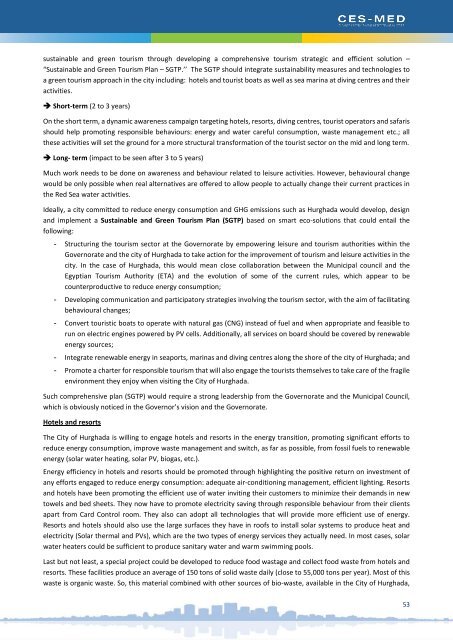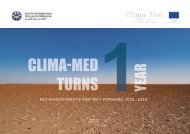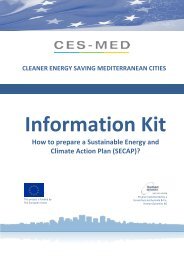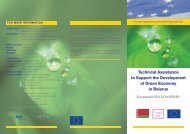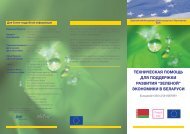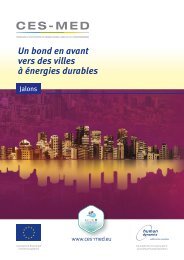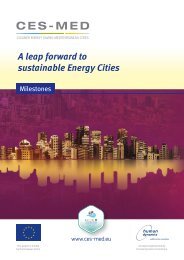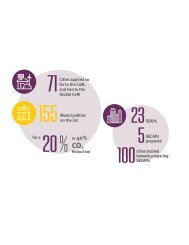020318_Hurghada SECAP_FINAL
Create successful ePaper yourself
Turn your PDF publications into a flip-book with our unique Google optimized e-Paper software.
sustainable and green tourism through developing a comprehensive tourism strategic and efficient solution –<br />
“Sustainable and Green Tourism Plan – SGTP.’’ The SGTP should integrate sustainability measures and technologies to<br />
a green tourism approach in the city including: hotels and tourist boats as well as sea marina at diving centres and their<br />
activities.<br />
Short-term (2 to 3 years)<br />
On the short term, a dynamic awareness campaign targeting hotels, resorts, diving centres, tourist operators and safaris<br />
should help promoting responsible behaviours: energy and water careful consumption, waste management etc.; all<br />
these activities will set the ground for a more structural transformation of the tourist sector on the mid and long term.<br />
Long- term (impact to be seen after 3 to 5 years)<br />
Much work needs to be done on awareness and behaviour related to leisure activities. However, behavioural change<br />
would be only possible when real alternatives are offered to allow people to actually change their current practices in<br />
the Red Sea water activities.<br />
Ideally, a city committed to reduce energy consumption and GHG emissions such as <strong>Hurghada</strong> would develop, design<br />
and implement a Sustainable and Green Tourism Plan (SGTP) based on smart eco-solutions that could entail the<br />
following:<br />
- Structuring the tourism sector at the Governorate by empowering leisure and tourism authorities within the<br />
Governorate and the city of <strong>Hurghada</strong> to take action for the improvement of tourism and leisure activities in the<br />
city. In the case of <strong>Hurghada</strong>, this would mean close collaboration between the Municipal council and the<br />
Egyptian Tourism Authority (ETA) and the evolution of some of the current rules, which appear to be<br />
counterproductive to reduce energy consumption;<br />
- Developing communication and participatory strategies involving the tourism sector, with the aim of facilitating<br />
behavioural changes;<br />
- Convert touristic boats to operate with natural gas (CNG) instead of fuel and when appropriate and feasible to<br />
run on electric engines powered by PV cells. Additionally, all services on board should be covered by renewable<br />
energy sources;<br />
- Integrate renewable energy in seaports, marinas and diving centres along the shore of the city of <strong>Hurghada</strong>; and<br />
- Promote a charter for responsible tourism that will also engage the tourists themselves to take care of the fragile<br />
environment they enjoy when visiting the City of <strong>Hurghada</strong>.<br />
Such comprehensive plan (SGTP) would require a strong leadership from the Governorate and the Municipal Council,<br />
which is obviously noticed in the Governor’s vision and the Governorate.<br />
Hotels and resorts<br />
The City of <strong>Hurghada</strong> is willing to engage hotels and resorts in the energy transition, promoting significant efforts to<br />
reduce energy consumption, improve waste management and switch, as far as possible, from fossil fuels to renewable<br />
energy (solar water heating, solar PV, biogas, etc.).<br />
Energy efficiency in hotels and resorts should be promoted through highlighting the positive return on investment of<br />
any efforts engaged to reduce energy consumption: adequate air-conditioning management, efficient lighting. Resorts<br />
and hotels have been promoting the efficient use of water inviting their customers to minimize their demands in new<br />
towels and bed sheets. They now have to promote electricity saving through responsible behaviour from their clients<br />
apart from Card Control room. They also can adopt all technologies that will provide more efficient use of energy.<br />
Resorts and hotels should also use the large surfaces they have in roofs to install solar systems to produce heat and<br />
electricity (Solar thermal and PVs), which are the two types of energy services they actually need. In most cases, solar<br />
water heaters could be sufficient to produce sanitary water and warm swimming pools.<br />
Last but not least, a special project could be developed to reduce food wastage and collect food waste from hotels and<br />
resorts. These facilities produce an average of 150 tons of solid waste daily (close to 55,000 tons per year). Most of this<br />
waste is organic waste. So, this material combined with other sources of bio-waste, available in the City of <strong>Hurghada</strong>,<br />
53


